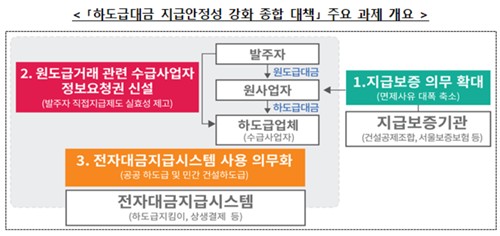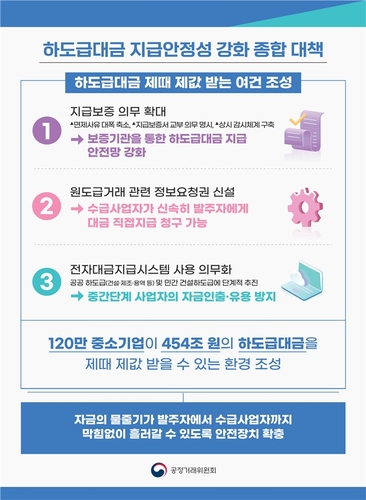(Seoul=Yonhap Infomax) Pil Joong Jeong = South Korea will require payment guarantees for all construction subcontract transactions, except for small-scale projects valued at 10 million won ($7,500) or less. The Fair Trade Commission (FTC) announced on the 23rd that it will significantly reduce the exceptions that have previously undermined the effectiveness of mandatory payment guarantees.


The revised measures will explicitly stipulate in the Subcontracting Act that prime contractors must provide payment guarantee certificates to subcontractors, ensuring that subcontractors can verify whether a guarantee has been secured. Subcontractors will also be granted the right to request information on the main contract transaction.
The FTC unveiled its comprehensive plan to strengthen the stability of subcontract payment settlements, following discussions with a task force comprising experts recommended by academia, the legal community, and economic organizations such as the Korea Chamber of Commerce and Industry, Korea Federation of SMEs, Korea Construction Association, and Korea Specialty Contractors Association.
The new policy introduces a triple-layered protection mechanism—payment guarantee institutions, project owners, and electronic payment systems—to ensure that subcontractors receive payments even if the prime contractor defaults.
Previously, payment guarantee obligations could be waived if the project owner paid subcontractors directly (direct payment agreement) or if an electronic payment system was used to separate payments for each party involved. Projects valued at 10 million won ($7,500) or less were also exempt. However, if the project owner also became insolvent, subcontractors could not recover payments from either the owner or the guarantee institution, highlighting a critical vulnerability.
To address this, the FTC will now limit exemptions to only small-scale projects of 10 million won or less, removing all other grounds for exemption.
The payment guarantee system ensures that if a prime contractor fails to pay due to bankruptcy or other reasons, a guarantee institution—such as the Construction Guarantee Cooperative or Seoul Guarantee Insurance—will pay the subcontractor on their behalf.
The obligation for prime contractors to issue payment guarantee certificates to subcontractors will be codified to prevent cases where subcontractors are unaware of the guarantee and thus unable to claim compensation.
The FTC will also establish a continuous monitoring system to ensure compliance, conducting annual written surveys of 5,000 construction firms and initiating direct investigations and sanctions for non-compliance.
Subcontractors will be empowered to request information on main contract transactions, addressing the current challenge where subcontractors cannot assess the risk of non-payment if the prime contractor has not received payment from the project owner. With this information, subcontractors can directly claim payment from the project owner in cases of non-payment.
The use of electronic payment systems will also become mandatory. These systems clarify the allocation of funds between prime and subcontractors, reducing the risk of fund misappropriation by intermediaries. Previously, only incentives such as bonus points in fair trade agreement evaluations were offered for using the system, but the FTC now plans to make its use compulsory in both public and private sector construction subcontracts through inter-agency consultations.
To alleviate the burden on prime contractors, the FTC will revise regulations to ensure that the maximum guarantee amount does not exceed the subcontract amount, addressing cases where the required guarantee was up to twice the subcontract value. Additional payment guarantees will also be exempted for small-scale projects where the benefit is negligible.
The FTC expects that by strengthening the triple-layered protection of guarantee institutions, project owners, and electronic payment systems, funds will flow smoothly from project owners to subcontractors, ensuring timely and full payment. The commission added that it will implement these measures swiftly so that their impact is felt on the ground.
joongjp@yna.co.kr
(End)
Copyright © Yonhap Infomax Unauthorized reproduction and redistribution prohibited.

